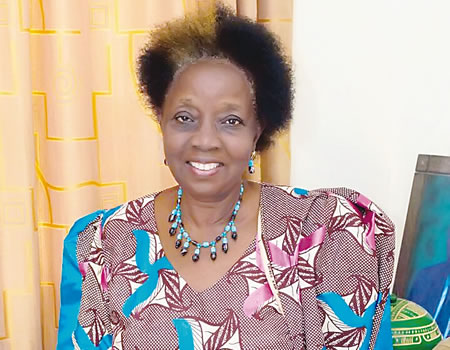NOW that you are retired, how would you engage yourself?
I’m so busy. There are church activities I’m involved in. I’m a lay preacher at the Methodist Church Nigeria (MCN). I’ve been a lay preacher since 2006. I have books I’m working on. I do hat work and I am a bead artist. I also design clothes and bags. So, I am very busy.
You have been in the education system for more than 40 years. When you look at Nigeria’s education system, how would you say the country has fared?
We should stop building universities. Many of these institutions are ill-equipped and the products that come out of them are weak. The university cannot perform magic on such students – it is garbage in, garbage out. We have to reinvent the whole education system, and make sure that even those coming out of secondary schools are well trained. We don’t need new universities. What we need to do is to equip the ones that are already on ground.
So, are you saying the number of universities in Nigeria can conveniently cater to the number of those seeking admission?
I think they can handle the number of qualified applicants. Others who are interested can be trained in skills. I have said it many times that we need to industrialise this nation. Industrialisation is the key to poverty alleviation. Not everyone is cut out for university education. In any case, what is the use of a degree when you don’t have a job or when you are underemployed?
What do you miss about your husband?
I had a very wonderful husband. He was a Christian. I miss the family devotion, the companionship. He was very caring and provided for my needs and that of the children. He was a very nice man and I miss him every day. He passed on seven years ago. We were married for 41 years.
There are reports of the challenges widows go through in Nigeria. Do you think widows are treated fairly now?
I don’t think so. Widows are not treated fairly. Even in places in the South-West, once a man dies, the family just comes in and take over his property. They give the wife an option of marrying one of the relatives, even if that relative already has two wives. If the widow refuses, she is asked to leave. So, widows are not treated fairly at all in our environment.
What ways do you think challenges that affect widowhood can be addressed?
Everybody should write a will. My father had a will; my husband had a will. If there is a will, even if there would be problems, it would be minimal. Once the will is read, whoever doesn’t like the contents, too bad. And people usually don’t bother to contest it and that solves many problems. Women also need to be trained to be financially independent. When my husband died, I was a senior lecturer, before I became professor and I’m able to look after myself. In fact, I got my PhD long ago – in 1975 – and I have been contributing to taking care of the home. So, there was no problem when my husband passed on. Everybody should be trained, especially the girl-child, on financial responsibility.
What is your advice to women who lost their husbands at a very young age?
There are two groups. One, the very young ladies, with or without children – those ones I would ask them to prayerfully look for another husband. It helps to have a husband by one’s side, and for children to have a father figure. For the older widows, there are even biblical instructions on that. At that age, they probably have no plans of remarrying. For those women, they should find active ways to engage themselves, such as with religious activities and family. For those who feel they have a strong need to remarry, they can do so. For me, I decided not to remarry. I can’t take care of any other man the way I took care of my husband.
You have talked about widows remarrying. However, it would seem men find doing that easier than women. Why do you think that is so?
There are many women looking for husbands. Even at that, there are many men who don’t remarry, sometimes because of the children, because when such men remarry, the new wife may come between the man and his children and this is not the best. For women, it is easier to be alone. They can take care of themselves better, without necessarily needing assistance, once they have the financial backing.
What is your advice to men on ensuring that the families they leave behind, in the event of their deaths, are taken care of?
The first thing is that any man over the age of 40 should have a will. I don’t know why people are hesitant when it comes to wills. Anyway, I was also illiterate on the subject. When I discovered my husband wrote a will twenty years before he died, I was very upset and I questioned him on it despite the fact that my own father wrote a will. So, my husband explained to me that it was the right thing to do. And the will should be updated as often as necessary. Not only men, women too should have wills.
Women should have wills too?
Yes. It is important. For instance, my husband and father, when they died, left some things in my care. When eventually I die, who takes care of those things? That is why I have to make sufficient arrangement for that. It is very important. Everyone should be able to do that.
You are in your 70s, and have seen Nigeria through pre-independence and now, post-independence. Do you think the country is living up to its potential?
Not at all. We are not where we should be at all. Before independence, things were a lot better. Even the state of literacy is disappointing. People don’t even speak good indigenous languages, not to talk of English language. Nigeria needs to be re-invented. Unfortunately, it is not this crowd that will do it. They don’t have the right perspective.
Men have led for as long as the country can remember. Do you think women would do better as presidents, governors?
I don’t call myself a feminist and I will not say a woman is necessarily better than a man. The important thing is for the person to have a vision of ensuring true development.
You were married for 41 years. Nowadays, it would seem more people take pride in being baby mamas and baby daddies, than embrace a long-lasting marriage. Why do you think this is the case?
First, I don’t subscribe to the idea of getting married because there is a pregnancy involved. I don’t like that. You get married because you love the person sufficiently to want to be with the person. It means you are ready to be patient and tolerant with the person. Also, there is need for sincerity and trust. Once trust is eroded, the marriage is on shaky ground. Also, there must be the fear of God. Things will not always be rosy and that is where patience is key.





